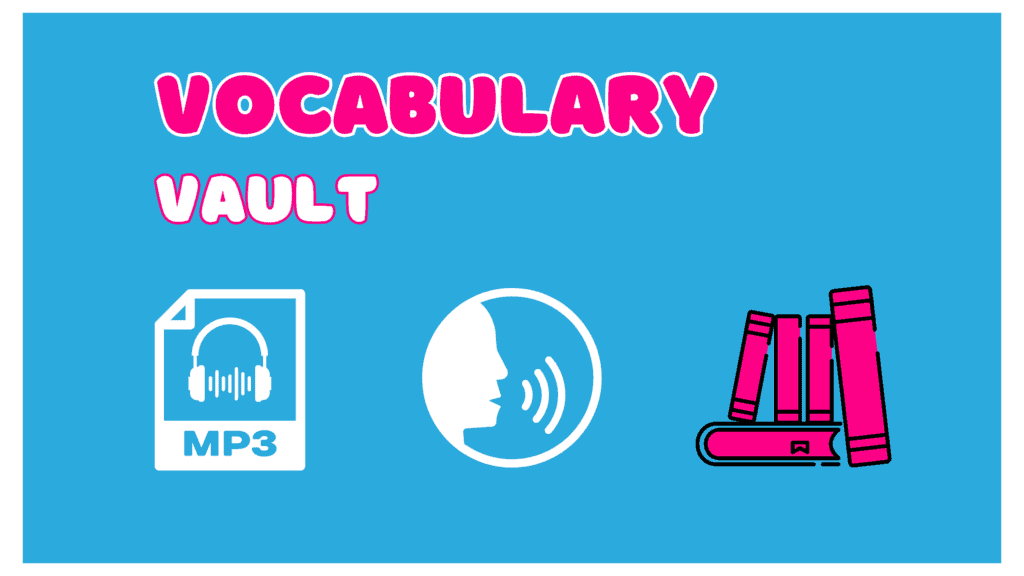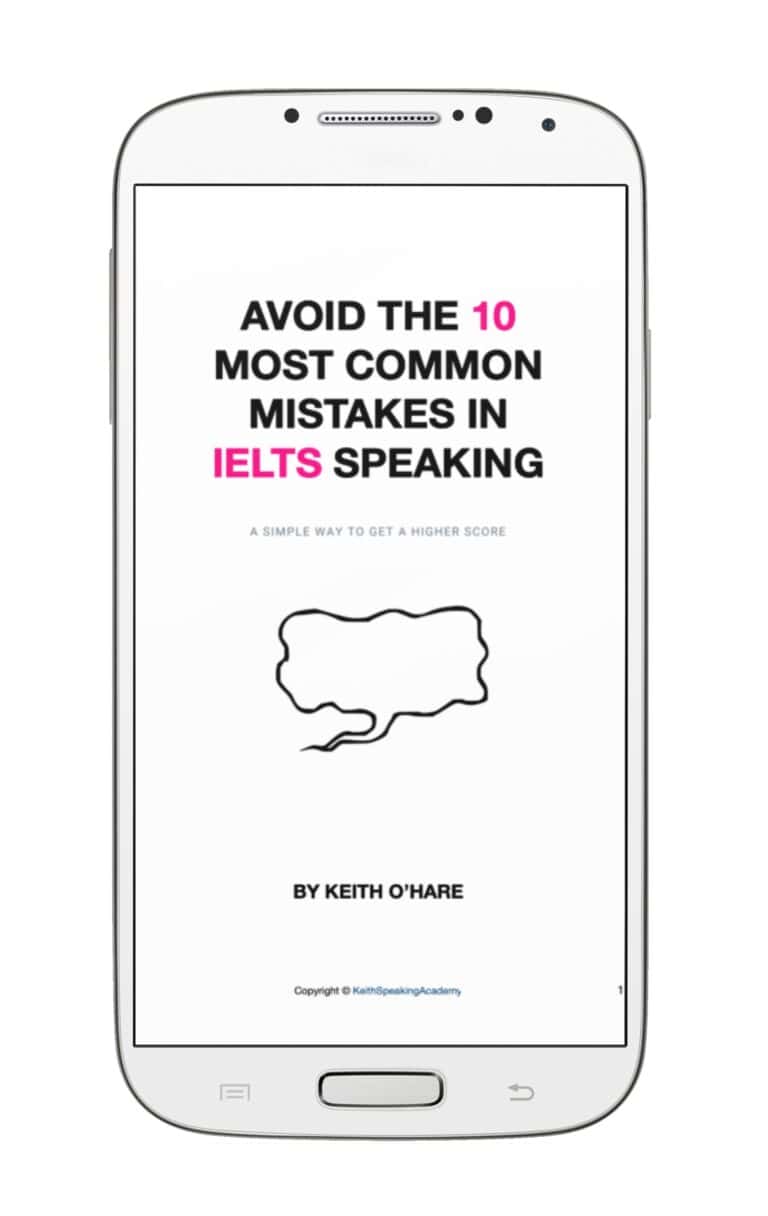IELTS Speaking Lesson about Jobs
👇 Take this lesson with you! 👇
What are the different IELTS Speaking Job questions you will get in the test?
Here are some common questions you might be asked on this topic, including questions for Part 1, Part 2 and Part 3.
In this free IELTS Speaking lesson, you will learn lots of vocabulary, collocations and idioms to help you talk fluently and answer these questions confidently.
What you will learn
IELTS vocabulary: Jobs
Here is some essential language to answer IELTS Speaking Job questions
What’s the difference between JOB and WORK?
Job (n.) Countable
I have two jobs and I like both of them.
Work (n.) Uncountable
I have a lot of work to do
We can make ‘work’ countable by adding ‘a piece of’ – the same way we make other words countable like news, advice, information
I have a piece of work / advice / news / information for you
We can also use ‘work’ as a countable noun when talking about art or possibly literature.
This is a work of art by Picasso (Countable)
His works are great. (Countable)

Collocations
Work is also a verb (v.)
- To work hard
- To work part time / full time
- Work from home = to work remotely = I like working virtually
I have a well paid job / badly paid job
- A white collar job = indoors, office job (banker)
- A blue collar job = outdoors, manual job (mechanic)
I work shifts (work specific hours of the day)
As a doctor I sometimes have to work the night shift
- It’s arduous work = difficult / hard
- It’s rewarding work = you enjoy it and it is satisfying
- This is a sterling piece of work = fantastic
- This is a shoddy piece of work = terrible, low quality
I know this report is shoddy, but I was up all night burning the midnight oil (working late into the night) all to meet my deadlines, and I know it’s not up to scratch (good enough), but please give me some slack (give me a break, take some pressure off me!)
Phrasal Verbs
Phrasal verbs are vey common in spoken English.
Basically it is where the meaning of a verb is changed by adding a preposition
For example:
- To speak = to talk, say something
- To speak up = to speak more loudly
- To put = to place something somewhere
- To put off = to delay something
Here are some more examples of phrasal verbs that can be used when talking about jobs.
- I put in a lot of work (=to do)
- I have taken on too much work (=start / accept)
- Let’s get down to work (=begin)
Talking about your job
Here are some useful phrases or templates you can use to talk about your job.
- I work as a _______ (teacher, builder, banker…)
- I work in _______ (sales/ marketing/education…THE FIELD)
- I work in a ______ (hospital, school, bank..PLACE)
- I work for _______ (Amazon, a multinational company….)
What you like about your job
Here are some useful phrases or templates you can use to answer this question
- I love the fact that ___ I can ….
- Well, it’s good because I get to _____
- What I really like about my job is ______
Ideal jobs
Here are some useful phrases or templates you can use to answer this question
- My ideal / target / dream job is to work as a ________ (carpenter, astronaut …)
- I wish I worked _____
- I would love to be a/an _____
- I long to be a / an _____

Listening practice
Watch the video below and answer the questions below.
1. What is my ideal job?
Also try to fill in the gaps below with the correct collocation.
- Put on a _________
- To my _________
- The adrenaline _________
- Financial _________
- It’s more of a _________ than a passion
Answers at the bottom of the page
Idioms to talk about jobs
Here are a number of idioms that can be used when talking about jobs and work.
This job suits me down to the ground (=it’s 100% match / perfect for me)
She never does a stroke of work (=she is so lazy, does the least work possible)
She doesn’t pull her weight (=she is too lazy)
I like to pull my weight (=to work hard, do what I am responsible for)
He made light work of it (=he did it easily)
This job is a cushy number (=it’s an easy job)
It’s not a great job, but at least I can get a foot in the door (=start working in a company – with a view to getting a higher position there)
I have hit a glass ceiling (=invisible barrier), I can’t go any further in this company
I have a lot on my plate (= I am very busy)
Student's questions about jobs
Keith, why do you think people quit their jobs?
I think there’s probably a multitude of different reasons and obviously it depends on the circumstances,
but I would say for a lot of people, nowadays, one of the main reasons they give up their job is because of the
stress. You know, lot of people are under stress. They have to work hard. They have to meet deadlines, tight
deadlines, so huge amounts of pressure on them and so a lot of them will just give up the jobs because it’s not
worth sacrificing your health for the work that you are doing.
Listening practice: Answer key
- I want to be an actor
- Put on a play
- To my surprise
- The adrenaline rush
- Financial instability
- It’s more of a whim
Pronunciation Files For Vocabulary From My Best Live Lessons
Use Words EASILY in English Conversations!
More Free IELTS Speaking Lessons
If you liked this lesson, leave a comment below!
There are more lessons you can follow in the links below too.
HOME in IELTS Speaking. Learn vocabulary and idioms to discuss your home, different parts of your house and accommodation in the past.
SKILLS in IELTS Speaking. Learn the collocations and adjectives to talk about skills we learn and need.
TECHNOLOGY in IELTS Speaking. How to talk about technology, the internet and artificial intelligence.



Hi keith..
You’re a good English Teacher and You did your job very responsible and very smartly. I have leant a lot from you for my IELTS exam. I want you to say Thank you for the kindness support and highly appreciate your good work ,
Rajini Rodrigo From Sri Lanka
My pleasure Rajini Rodrigo!
Dear Keith
Such a wonderful teacher you are!
I’m so grateful that I could find your website on the Internet!
I’m writing from “Iran” and I’m pretty sure I would ace the test with the help of your great videos.
I wanted to say that I am extremely obliged to you, for this sterling piece of work you are doing here for free and certainly introduce your videos to everyone I know.
Regards,
Venus
Hi Venus, delighted to help and thanks for your lovely message.
Hi keith..thanks so much for sharing knowledge with us…really interesting to learn English with you…
Indika from Sri Lanka
Happy to see you here learning with me!